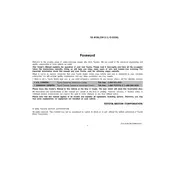Toyota Avalon 2003 Owner's Manual


The recommended oil type for the 2003 Toyota Avalon is 5W-30. This ensures optimal performance and fuel efficiency.
The timing belt on a 2003 Toyota Avalon should be replaced every 90,000 miles or 6 years, whichever comes first, to prevent engine damage.
The recommended tire pressure for the 2003 Toyota Avalon is 30 PSI for both front and rear tires.
To reset the maintenance light, turn the ignition to the "ON" position, then press and hold the odometer reset button. Turn the ignition off and continue holding the button. Turn the ignition back on while holding the button until the light goes off.
Common causes include a loose gas cap, faulty oxygen sensor, worn spark plugs, or a malfunctioning catalytic converter. A diagnostic scan tool can pinpoint the exact issue.
Check the A/C fuse and relay, inspect the refrigerant level, and ensure the compressor clutch is engaging. If the problem persists, a professional inspection may be necessary.
The 2003 Toyota Avalon uses a Toyota Long Life Coolant or an equivalent non-silicate, non-borate, non-nitrite, and non-amine coolant.
Open the glove box and remove the damper arm. Press in on the sides of the glove box to release it. Locate the cabin air filter cover and remove it to access and replace the filter.
Symptoms include dimming headlights, battery warning light on the dashboard, electrical issues, and a dead battery. A voltage test can confirm alternator health.
Regular maintenance such as keeping tires properly inflated, using the recommended oil, replacing air filters, and ensuring spark plugs are in good condition can improve fuel efficiency.